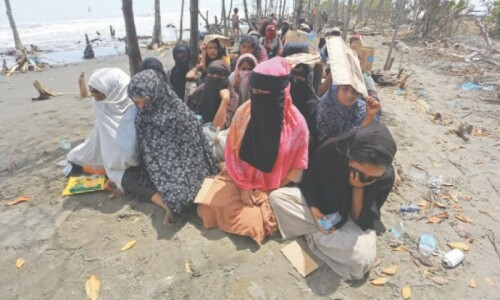JAKARTA: Indonesian President Joko Widodo pleased market reform advocates on Wednesday by bringing home the World Bank’s managing director to be finance minister and upset human rights activists by naming a controversial ex-general as security chief.
The surprise appointments of Sri Mulyani Indrawati to head the finance ministry and Wiranto as coordinating minister for politics, law and security were part of a wider-than-expected cabinet reshuffle in which the trade, energy, transport and industry ministers were also replaced.
“I am aware that the challenge keeps changing and it needs quick action from us,” Widodo told reporters, adding that unemployment and income inequality must be addressed and the cabinet needed to work “more quickly, more effectively”.
The addition of Indrawati to the president’s economic team lifted financial markets, with stocks closing one per cent higher and the rupiah strengthening 0.4 per cent against the dollar.
“Sri Mulyani’s appointment is a game-changer because it restores a certain amount of investor confidence and means having a steady hand on the tiller with a solid record as a reformer,” said Paul Rowland, a Jakarta-based analyst.
In 2010, Indrawati joined the World Bank after serving as both Indonesia’s chief economic minister and finance minister under a previous president, Susilo Bambang Yudhoyono.
Six years later, she officially returned to Indonesia, wearing a blue batik outfit and a pearl necklace at a handover ceremony at the finance ministry in Jakarta.
“This task is a noble task but it is not light,” Indrawati said as she accepted her appointment. She listed reducing poverty and inequality, creating job opportunities and restoring business confidence as priorities.
Crisis management
Indrawati, who has a doctorate in economics from the University of Illinois and is not a member of a political party, won praise for successfully managing Indonesia’s economy through the 2008 global financial crisis.
“The president wants a dream team to manage economic policies so that we can accelerate [growth]. He needs Sri Mulyani,” said David Sumual, chief economist for Bank Central Asia.
Indonesia’s economic growth is expected to improve only slightly in the second quarter from 4.92 per cent in the first three months of the year. The finance ministry has forecast full-year GDP growth of about 5.2 per cent in 2016, up from 4.79 per cent last year.
Bambang Brodjonegoro, the finance minister Widodo appointed in 2014, has been shifted to head the national development planning agency.
The change in finance ministers comes just after Indonesia launched a tax amnesty it hopes will bring home billions of dollars that Indonesians have parked overseas.
Widodo also surprised many by announcing Wiranto as his new chief security minister, reassigning his close adviser Luhut Pandjaitan to be chief maritime minister.
‘Very old guard’
Wiranto, army chief when strongman Suharto quit amid protests in 1998, was indicted by a UN panel over the bloodshed surrounding East Timor’s 1999 independence vote, when about 1,000 people died. The former general has denied any wrongdoing in East Timor. “He is part of the very old guard of Suharto’s New Order,” said Andreas Harsono, Indonesia director of Human Rights Watch. “This is really bad news for human rights.”
Analysts viewed Wiranto’s appointment and others as politically motivated, as the president looks to consolidate support from parties keen to join the ruling coalition.
Wiranto controls Hanura, “a party which has supported Jokowi from the get-go, and one way of seeing this is for the president to secure its continued support”, wrote Wellian Wiranto, economist at OCBC.
The president also welcomed the second-largest political party, Golkar, into the cabinet by appointing Airlangga Hartarto as industry minister.
Golkar, which was in opposition to Widodo when he was elected in 2014, played a key role in getting the president’s tax amnesty bill passed this year.
Published in Dawn, July 28th, 2016















































Dear visitor, the comments section is undergoing an overhaul and will return soon.